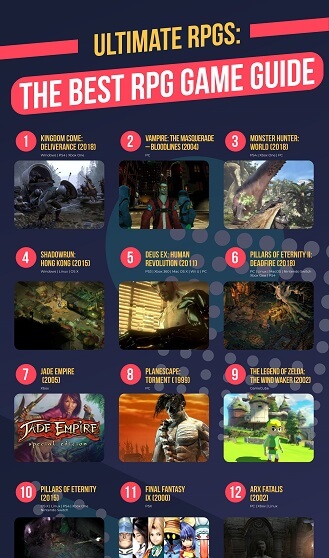
Level Up Your Game: A Comprehensive Guide to Conquering RPGs
Role-Playing Games (RPGs) are a cornerstone of the gaming world, offering immersive experiences filled with compelling narratives, intricate character development, and strategic combat. But with their often complex systems and vast open worlds, getting started – or even mastering – an RPG can feel daunting. This guide is designed to equip you with the knowledge and strategies to conquer any RPG, from classic turn-based adventures to modern action-packed epics.
I. Understanding the RPG Landscape: A Genre Overview
Before diving into specific tips, it’s crucial to understand the diverse landscape of RPGs. The genre encompasses a wide range of subgenres, each with its unique characteristics:
-
Classic Turn-Based RPGs: Think Final Fantasy, Dragon Quest, and early Fallout. These games feature strategic turn-based combat, deep storytelling, and often a focus on party management. Success hinges on understanding enemy weaknesses, mastering character abilities, and planning your moves carefully.
-
Action RPGs (ARPGs): Diablo, Path of Exile, and Grim Dawn are prime examples. These games prioritize fast-paced combat, loot collection, and character customization through skill trees and equipment. Mastering timing, positioning, and build optimization are key to survival.
-
Open-World RPGs: The Witcher 3, The Elder Scrolls, and Fallout (modern iterations) fall into this category. These games offer sprawling open worlds to explore, filled with quests, secrets, and dangers. Exploration, resource management, and decision-making play a vital role in the overall experience.
-
Tactical RPGs (TRPGs): Fire Emblem, XCOM, and Divinity: Original Sin represent this subgenre. TRPGs emphasize strategic combat on grid-based maps. Positioning, terrain utilization, and understanding unit strengths and weaknesses are crucial for victory.
-
MMORPGs (Massively Multiplayer Online RPGs): World of Warcraft, Final Fantasy XIV, and Guild Wars 2 are prominent examples. These games feature persistent online worlds where players interact, cooperate, and compete. Social interaction, teamwork, and long-term character progression are central to the MMORPG experience.
Understanding the specific subgenre you’re playing will help you tailor your approach and focus on the mechanics that matter most.
II. Character Creation and Development: The Foundation of Your Journey
Creating your character is often the first step in any RPG, and it’s a crucial one. This initial decision significantly impacts your gameplay experience. Here’s what to consider:
-
Stats and Attributes: Most RPGs feature a core set of stats like Strength, Dexterity, Intelligence, and Charisma. These stats influence your character’s abilities and determine how they interact with the world. Carefully consider which stats are most important for your desired playstyle. Do you want to be a powerful warrior, a cunning mage, or a charismatic diplomat?
-
Class Selection: Your class defines your character’s role in combat and their available abilities. Classes often include Warriors, Mages, Rogues, Healers, and hybrids. Read the class descriptions carefully and choose one that aligns with your preferred playstyle.
-
Race/Species: Some RPGs offer a choice of race or species, which can affect your starting stats, resistances, and even dialogue options. Consider the racial bonuses and how they complement your chosen class.
-
Skills and Abilities: As you level up, you’ll gain access to new skills and abilities. Experiment with different builds and find a combination that works well for you. Don’t be afraid to respec (reset your skill points) if you’re not happy with your current build.
-
Understanding Synergies: Many RPGs feature complex skill systems with synergistic effects. Look for abilities that complement each other and create powerful combinations. For example, a warrior might benefit from skills that increase their damage output and skills that provide defensive buffs.
III. Mastering Combat: From Basic Attacks to Strategic Maneuvers
Combat is a core element of most RPGs. Here’s how to improve your combat skills:
-
Know Your Enemy: Before engaging in combat, take a moment to observe your enemies. Identify their weaknesses, resistances, and attack patterns. This information will help you choose the right tactics and abilities.
-
Utilize Positioning: Positioning is crucial in many RPGs, especially TRPGs and action-oriented games. Use cover, flank enemies, and control the battlefield to your advantage.
-
Master Your Abilities: Understand the range, damage, and effects of your abilities. Practice using them effectively and learn how to chain them together for maximum impact.
-
Manage Your Resources: Pay attention to your health, mana, and other resources. Use potions, spells, and other items to replenish your resources and stay alive.
-
Learn to Dodge and Block: In action RPGs, dodging and blocking are essential for survival. Practice timing your dodges and blocks to avoid taking damage.
-
Exploit Environmental Hazards: Some combat environments contain hazards that you can use to your advantage. For example, you might be able to trigger an explosion or collapse a structure on your enemies.
-
Party Composition (If Applicable): If you’re playing with a party, ensure a balanced composition. Include characters who can deal damage, heal, and provide support.
IV. Exploration and Questing: Unveiling the World’s Secrets
RPGs are often set in vast and detailed worlds. Here’s how to make the most of your exploration:
-
Talk to Everyone: NPCs (Non-Player Characters) are a valuable source of information, quests, and lore. Talk to everyone you encounter and listen carefully to what they have to say.
-
Explore Every Nook and Cranny: Don’t be afraid to stray off the beaten path. Hidden areas often contain valuable loot, secrets, and challenging encounters.
-
Read Everything: Books, scrolls, and other written materials can provide valuable information about the world, its history, and its inhabitants.
-
Pay Attention to Your Surroundings: Look for clues in the environment. These clues might lead you to hidden quests, secret passages, or valuable items.
-
Manage Your Inventory: Inventory management is a crucial aspect of many RPGs. Keep track of your items and sell or discard anything you don’t need.
-
Keep a Journal (In-Game or Real-World): Taking notes on quests, locations, and important characters can help you stay organized and avoid getting lost.
-
Prioritize Quests: Most RPGs offer a variety of quests. Prioritize quests that are appropriate for your level and that offer valuable rewards.
V. Gear and Equipment: Equipping Yourself for Success
Acquiring powerful gear is a key aspect of character progression in many RPGs. Here’s how to optimize your equipment:
-
Understand Gear Stats: Pay attention to the stats on your gear. Different stats will be more important depending on your class and build.
-
Compare Gear: Always compare new gear to your existing gear to see if it’s an upgrade.
-
Crafting and Enchanting: Many RPGs allow you to craft or enchant gear to improve its stats. Take advantage of these systems to create powerful equipment.
-
Don’t Neglect Defenses: While offensive stats are important, don’t neglect your defenses. Ensure you have adequate armor and resistances to survive tough encounters.
-
Consider Set Bonuses: Some games offer set bonuses for equipping multiple pieces of the same armor set. These bonuses can be very powerful.
-
Repair Your Gear: Damaged gear is less effective. Regularly repair your gear to maintain its optimal performance.
VI. Advanced Tips and Strategies:
-
Learn to Exploit Enemy AI: Many RPGs have predictable enemy AI. Learn how to exploit these patterns to your advantage.
-
Optimize Your Party Composition (If Applicable): Experiment with different party compositions to find the best synergy between your characters.
-
Use Consumables Strategically: Consumables like potions, scrolls, and grenades can be game-changers in tough encounters. Use them strategically to turn the tide of battle.
-
Don’t Be Afraid to Grind: Sometimes, you’ll need to grind for experience or resources to overcome a difficult challenge.
-
Utilize Online Resources: Websites, forums, and wikis are valuable resources for finding information about RPGs. Don’t hesitate to consult them if you’re stuck or need help.
-
Experiment and Have Fun: The most important thing is to experiment with different strategies and have fun. RPGs are meant to be enjoyed, so don’t be afraid to try new things and discover what works best for you.
By following these tips and strategies, you’ll be well-equipped to conquer any RPG and embark on epic adventures. Remember to adapt your approach based on the specific game you’re playing, and most importantly, have fun exploring the rich and rewarding world of RPGs!

